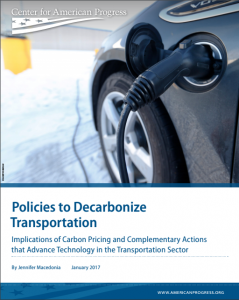Full Title: Policies to Decarbonize Transportation
Author(s): Jennifer Macedonia
Publisher(s): Center for American Progress
Publication Date: January 1, 2017
Full Text: Download Resource
Description (excerpt):
On November 4, 2016, the Paris Agreement entered into force after the United States and nearly 200 other countries agreed to decarbonize the global economy by the second half of the century. The main purpose of the agreement is to strengthen the global response to the threat of climate change, with the goal of keeping global temperature rise below 2 degrees Celsius compared with preindustrial times while pursuing efforts to limit any increase to 1.5 degrees.1 According to the United States and other major economies, achieving this goal will require developed countries to reduce their emissions 80 percent or more by 2050.
Critical to any successful decarbonization plan is an effective and timely strategy to unleash the innovation and infrastructure deployment needed to achieve significant greenhouse gas emissions reductions in the transportation sector. In 2016, transportation became the United States’ highest carbon dioxide-emitting energy consumption sector.3 The U.S. midcentury decarbonization strategy projects that the country’s transportation sector would require an 86 percent reduction in fleetwide emissions intensity levels from 2015 to meet decarbonization goals.
Countries, states, and localities around the world are using and considering carbon pricing policies as a means of reducing the greenhouse gas emissions that significantly contribute to climate change. According to mainstream economic theory, if markets work well and carbon is priced at appropriate levels, the resulting price signals should be the most efficient and cost-effective means of reducing such emissions from a variety of human activities, including burning fossil fuels in ground transportation. An efficient carbon pricing program would provide a long-term price signal that is predictable, economywide, and of sufficient escalating strength to both drive the most cost-effective greenhouse gas reductions in the near term and motivate the innovation and transformation needed to reach longer-term goals.
